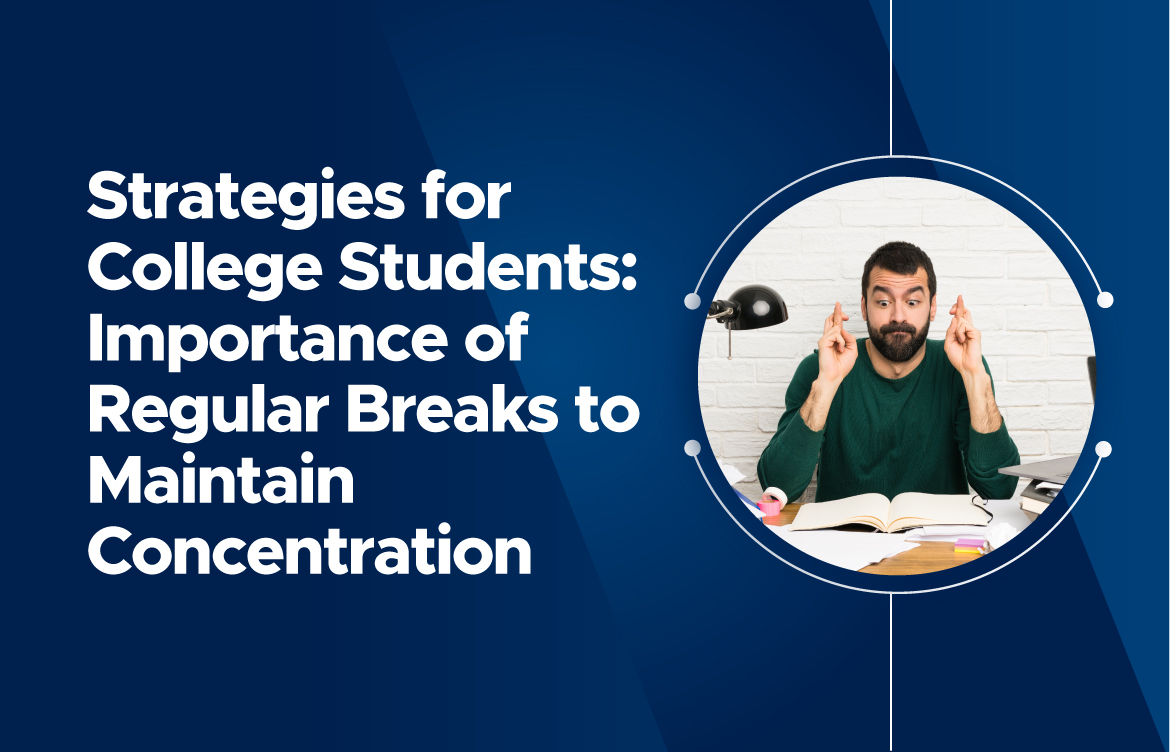Strategies for College Students: Importance of Regular Breaks to Maintain Concentration
College students frequently have to balance a lot of coursework, homework, extracurricular activities, and social obligations. Many students find it difficult to focus and be productive during the day when they have so much on their plates. But the significance of regular breaks is the solution to this issue. Read on to know why regular breaks are important for college students.
Importance of Regular Breaks for Students
Students in college face specific challenges in maintaining focus and productivity. Students frequently find themselves spending lengthy hours sitting at their computers, staring at screens, and absorbing massive amounts of information. This is because they have a lot on their minds between attending lectures, preparing for examinations, writing papers, and participating in extracurricular activities. But studies have shown that when we don’t take frequent breaks, our ability to focus weakens over time, increasing the chance of mistakes, burnout, and decreased productivity.
Furthermore, a transition to independent living and the pressures of academics can all cause high stress levels among college students. Regular breaks offer opportunities for rest and rejuvenation which can help reduce stress and enhance general well-being.
Strategies for College Students to Improve Concentration Throughout the Day
Now that we know the benefits of frequent breaks for college students, let’s look at some methods they may use to fit breaks into their schedules and stay focused:
The Pomodoro Technique
The Pomodoro Technique is a time management strategy that divides work into 25-minute segments and incorporates them with short breaks. Students are allowed to take a lengthier break of 15 to 30 minutes after finishing four intervals. This method offers regular opportunities for rest and re-energization, which helps maintain focus and productivity.
Scheduled Study Breaks
Instead of studying for a prolonged amount of time without stopping, students need to plan frequent study breaks into their everyday schedules. Every hour, for instance, people could schedule a five to ten-minute break to stretch, eat, or possibly take a nap. It is possible for students to avoid becoming tired and to stay focused during their study sessions by scheduling breaks at regular intervals.
Physical Activity Breaks
Students can benefit from physical and mental rejuvenation during breaks by participating in physical activities. Engaging in physical activity, such as walking, yoga poses, or a short game of basketball, can help improve mood, increase blood flow to the brain, and improve attention. To benefit from exercise’s positive effects on academic performance, students should push in at least 30 minutes of physical activity each day.
Meditation and Mindfulness
Students who practice mindfulness and meditation can become more aware of themselves, concentrate better, and experience a decrease in stress. Students can take a few minutes during breaks to close their eyes, concentrate on their breathing, and objectively study their thoughts. As an alternative, they can unwind and center themselves by using applications that offer guided meditation or by listening to soothing music.
Nature Breaks
Numerous advantages of spending time in nature have been demonstrated for mental health and general well-being. Students can use the green areas on campus or the surrounding parks as a place to go outside and relax in between study sessions or classes. Spending time outside can help lower stress and increase attention, whether you’re sitting under a tree, strolling about campus, or just taking in the views and sounds of nature.
Social Breaks
During breaks, maintaining connections with friends and classmates can help students refuel and offer much-needed social support. Students should try to take breaks throughout study sessions and have meaningful conversations with others rather than isolating themselves. Social breaks, such as getting coffee together, conversing in the library, or joining a study group, can reduce stress and elevate mood, which in turn improves focus and academic achievement.
Healthy Eating Habits
To maintain the best possible brain function and focus, a balanced diet is necessary. Eating wholesome meals and snacks throughout the day should be a priority for students in order to nourish their bodies and minds. Students can make and eat wholesome snacks including fruits, vegetables, nuts, and whole grains during their breaks. Preventing energy dumps and enhancing concentration and productivity can be achieved by avoiding processed and sugary foods.
Tech-Free Breaks
Digital tiredness and reduced focus can result from prolonged use of screens and other electronic gadgets. Students should have tech-free breaks where they disconnect from their gadgets and participate in offline activities in order to combat this. Tech-free breaks can help students refuel and reset their minds for peak performance, whether they are reading a book, taking a stroll, or engaging in a hobby.
College students need to take regular breaks in order to preserve their focus, output, and general well-being. Students can enhance their academic performance and lessen stress and burnout by adopting techniques like the Pomodoro Technique, planned study breaks, tech-free breaks, physical activity breaks, mindfulness and meditation, nature breaks, social breaks, and healthy eating habits into their daily routines. Recall that taking pauses is an essential component of a healthy and balanced approach to academic success, not a sign of weakness. Therefore, the next time you’re having trouble focusing, don’t be afraid to take a break and give yourself some time to recover. Your body and mind will appreciate it.



